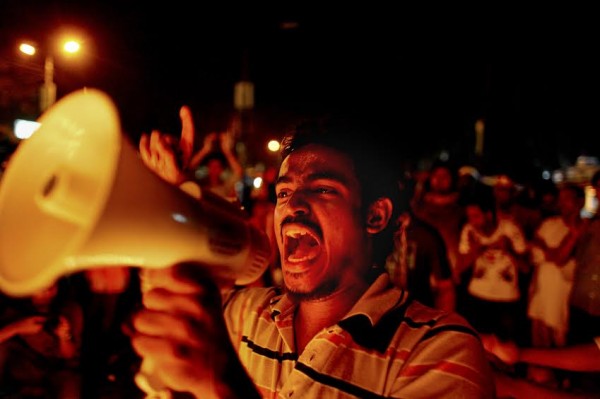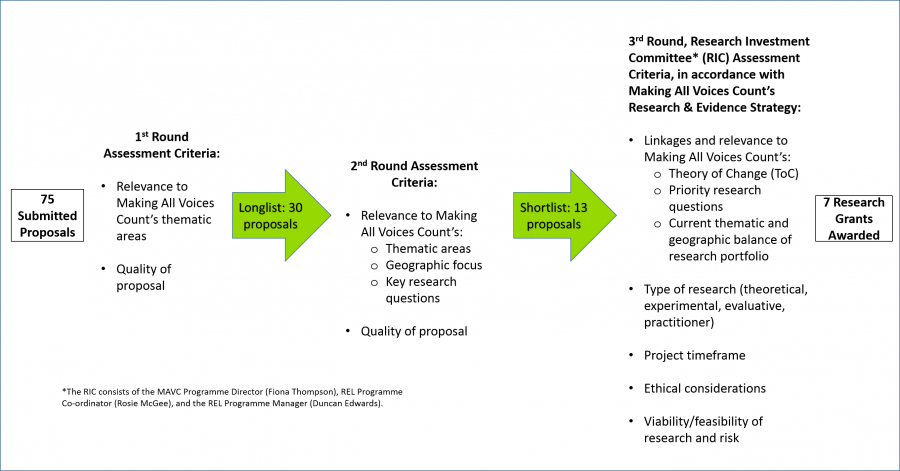What works, what doesn’t, and how in using technology for citizen voice, transparency and accountability
Today Making All Voices Count is announcing seven new research projects that are helping us build a deeper understanding and evidence base on the role of technology in accountable governance. The call for proposals was divided into two parts Research Grants and Practitioner Research and Learning Grants.
Rosemary McGee, Research Coordinator for Making All Voices Count, and Research Fellow at the Institute for Development Studies outlines why this research is important in helping answer critical and persistent questions about governance initiatives:
“I find it really exciting that the programme will be helping generate answers to some of the questions that I and others have struggled with for some time, about the contexts, actors, mechanisms and outcomes of tech-enabled citizen voice and government responsiveness initiatives.
A few years ago I was involved in reviewing the effectiveness and impact of transparency and accountability work and had to conclude that the evidence base was full of holes. These seven projects are steps towards filling in some of the holes in evidence and theory. But also, some of them are going to answer specific accountability-related needs of our priority countries, they will all build or strengthen analytical and research capacity, and they are all going to produce findings that will increase the quality and relevance of action in this sector.”
After a two month focussed call, our Research, Evidence and Learning team reviewed 75 proposals for Research Grants from researchers and organisations across the world.
Grants were selected in line with Making All Voices Count’s Research and Evidence Strategy and a three-stage assessment process (outlined at the end of this post). Practitioner Research and Learning Grants will be announced on our website shortly.
Research Grants selected for contracting, subject to due diligence are:
- Representation or Co-optation? Examining the Effects of Community Leadership Training in the Philippines.
- Organisation: MIT Gov/LAB.
- Amount: £75,000.
- Translating Complex Realities through Technology: Lessons About Government Responsiveness in South Africa.
- Organisation: The Sustainable Livelihoods Foundation.
- Amount: £75,000
- Tech Innovation Hubs: Are they actually shifting the “co-creation” paradigm?
- Organisation: Results for Development Institute.
- Amount:£74,690
- Evolving a Global Open eGovernance Index (OeGI) for Network Societies.
- Organisation: Foundation for Media Alternatives.
- Amount: £73,288
- Voice or Chatter? - Using Structuration Framework towards a Theory of ICT-mediated Citizen Engagement.
- Organisation: IT for Change.
- Amount: £44,025
- ‘Yesterday’: understanding everyday technology use amongst ‘hard to reach’ intended users of Technology for Transparency and Accountability Initiatives in South Africa.
- Organisation: Network Society Project, University of Witwatersrand.
- Amount: £74,770.
- Revisiting tools and platforms that support accountability to affected population during emergencies in the Philippines.
- Organisation: Sheena Carmel D. Opulencia-Calub.
- Amount: £55,290
These explore critical gaps in our conceptual understanding of openness and open government, ICT-mediated citizen engagement, the role of tech hubs in transforming governance, and how to reach those excluded from technology for transparency and accountability initiatives.
They ask much needed questions, such as:
- What conditions are required for technology, citizen voice and government responsiveness initiatives to work?
- What happens to citizen voice when it is mediated through technology?
- What are the potentials and limitations of tech hubs for improving governance?
- What factors contribute to the success of accountability and transparency initiatives in disaster relief contexts?
- What are the patterns of technology use of ‘hard to reach’ communities in South Africa?
Details of the original call can be found here.
Proposals submitted to the Research Call were screened and assessed in a three stage process:

